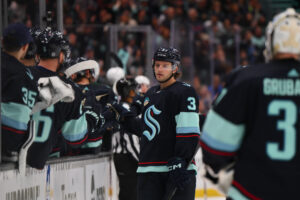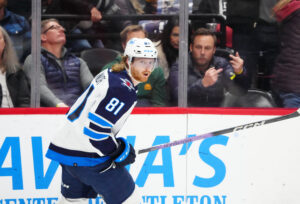There are many options when looking for the Vancouver Canucks MVP so far this season. The choices stack high as the reasons for optimism… and have just as strong a caveat.
So Far, So Pretty OK
Reminders Abound
Last season, the Canucks finished December with 19 wins after 42 games. It wasn’t great, but things were looking better than the last couple of years. Jake Virtanen had 11 goals, finally shoring up his claim to a middle-six role. Super-rookie Elias Pettersson scored 19 goals to go with 20 assists. Jacob Markstrom was looking just as solid in his second year as a starter as he did in his first.
None of it lasted.
Markstrom continued his strong play, though cracks showed more frequently than before. Pettersson wore down as the year lengthened, ending the year with a still very good 66 points. And Jake got just another four goals before year’s end. The Canucks as a whole finished with just 35 wins or 12 games below .500.
New Year, New Team?
Every season is a whole new story, of course! This time, the Canucks finished December with 21 wins after 40 games. Virtanen had 12 goals, and Pettersson was rolling strong with, er, 18 goals and 23 assists.
Hm.
Still, no reason to kick off 2020 pessimistically! There are plenty of feel-good stories to go with the team over the first three months. We’re going to focus on a few of the individuals here and see if we can pick out the Canucks’ MVP at the 40-game mark.
Honourable Mentions
Speaking of Jake Virtanen… The 23-year old has brought his game around in more ways than just scoring. Most notably, his scoring surge over the past 15 games has come with consistency. His longest pointless streak since November 27th has been two games. He’s contributing on the third line with Antoine Roussel and Adam Gaudette at just over 12 minutes a game. The same trio has been a very effective second power-play unit with Tanner Pearson. As a bonus, “Shotgun Jake” doesn’t look like it’s dying down any time soon. Fans forming a spontaneous connection with a player is never a bad thing.
Roussel himself is worthy of a mention here, too. He has been the perfect veteran for the two youngsters, fast enough to keep pace with Virtanen and smart enough to trust Gaudette’s offensive guile. He’s going to the dirty areas, digging out pucks, and getting results. With the bulk of defensive responsibility split between Bo Horvat and Jay Beagle, the Gaudette’s line is free to exploit weaker matchups.
Pearson may not be as important to the Canucks’ future as Virtanen, but it’s hard to deny him when he leads the team in scoring for almost half the season. At the latest tally, he has 17 points in his last 16 games, and last we checked you win games by scoring more than your opponents. He and Horvat have given the team a viable second scoring line, and there haven’t been many of those lately. None of these players is the Canucks’ MVP for the season, but a few weeks? Any of them can make a good argument.
Asterisk, Asterisk, Asterisk
The last honourable mention goes to… the Injury Fairies (“Hello, fairies!“). Yes, the Canucks have lost a considerable number of man-games to them. And yes, losing depth up front hurt them (Brandon Sutter, Josh Leivo, Micheal Ferland, Tyler Motte, Roussel). And sure, any time Alexander Edler misses puts far more pressure on this year’s star rookie. But of the top seven scorers, only Quinn Hughes has lost a single game to injury. Even Chris Tanev – a player who has managed to reach 70 games _once_ in nine seasons – has been completely healthy.
The Contestants Are…
Elias Pettersson
Not only is Pettersson registering a point a game in his second season, but he’s also doing it while anchoring one of the best lines in the league. According to Moneypuck, his line with Brock Boeser and J.T. Miller have nearly a 60% Corsi. The only other positive shot-attempt line is Horvat with Pearson and Leivo, who’s gone for the season. That second line was barely over 50% and replacing Leivo hasn’t improved it. Pettersson is under a lot of pressure to score, and he’s been so good at it that noted scorer Boeser may finish the season with twice as many assists as goals. An obvious choice for Canucks MVP, perhaps, but it’s not a one-horse race.
J.T. Miller
Miller was a controversial pickup not for his skills, but his cost. A first-round pick is a valuable asset on a rebuilding team; a first and a third even more so. Fortunately for the Canucks, he has been everything they could wish. He started on the second line while Ferland played on the top with Pettersson. Soon enough, he took Ferland’s place and never looked back. His high-pursuit game gets them the puck more often than not, and his versatility keeps him on the ice. Being an excellent face-off man means he plays in all situations, any forward position, and can rack up points doing it.
He’s signed for another three years at $5.25 million, and if he can maintain anything remotely close to this level for the duration then he will not only be a bargain financially but a trade win for Benning.
Quinn Hughes
A rookie as Canucks MVP is rare, but not entirely unheard of (see also: Petterson, Elias). But Hughes is worthy of consideration. He’s on pace to challenge Dale Tallon‘s rookie defenceman team record of 56 points. Which, if he did pull it off, would also put Hughes in the top ten league-wide. Coach Travis Green tried skating him in protected minutes, as expected, but Hughes refused to stay there. He’s averaging over 21 minutes per game, and his responsibilities only increased during Edler’s absence. Speaking of which…
Alex Edler
The Canucks’ current Elder Statesman in almost every way: his 845 games played with Vancouver is 359 more than second-place Tanev. He has 133 more career points with the Canucks than Horvat. The only players older than him are relatively recent arrivals Beagle and Loui Eriksson. Year after year he leads the team in ice time. Last season, he scored 10 goals and 34 points – his highest totals since 2011-12, the only year he played all 82 games. Oh, and did we mention he did it in just 56 games? But all of that is history. What has this supposed Canucks MVP done lately?
This year, the emergence of Hughes has allowed Green to cut back Edler’s average ice time – by all of 60 seconds. He plays three minutes a game short-handed, two on the power play, and always lines up against the hardest opponents. All this, and add to it 20 points in just 31 games so far this year. In those ten absent games, the team had a difficult December, going 5-5 without him.
Jacob Markstrom
Here’s where it’s difficult to look at what are relatively modest stats and think “Here’s the Canucks MVP!” He has 14 wins in 28 games, a .919 save percentage, a 2.63 goals-against average (pre-January 2nd game vs. Chicago Blackhawks). All perfectly decent numbers, but not off-the-charts good. So what gives?
There is a maxim here: goalies cannot win a game, they can only delay losing. It’s very difficult to isolate their contribution without seeing the games. The stats, though good, don’t do Markstrom justice. Seeing his shot map is better, but watching the sheer number of times he has been either left out to dry or peppered with high-danger shots leaves you searching for some other statistic to explain his value. The six points he’s earned Vancouver, estimated by Goalie Point Shares? The nine and a half goals saved above average? How about he was in net the first time Canucks won after allowing 50 or more shots? Maybe you just have to see it to believe it.
But I do know two things: he’s got my vote as the Canucks MVP for the first half of the season, and I’m looking forward to his 2019-20 highlight reel.
Main Photo:
Embed from Getty Images






